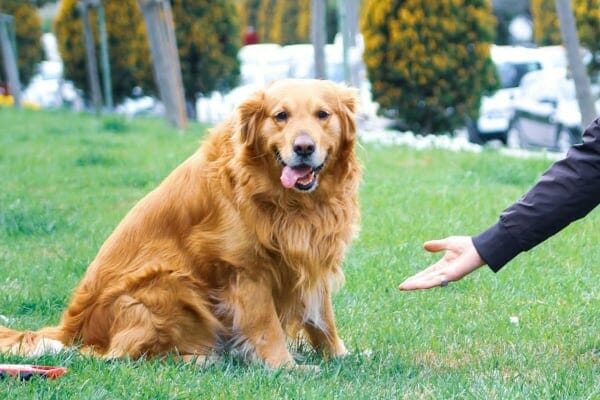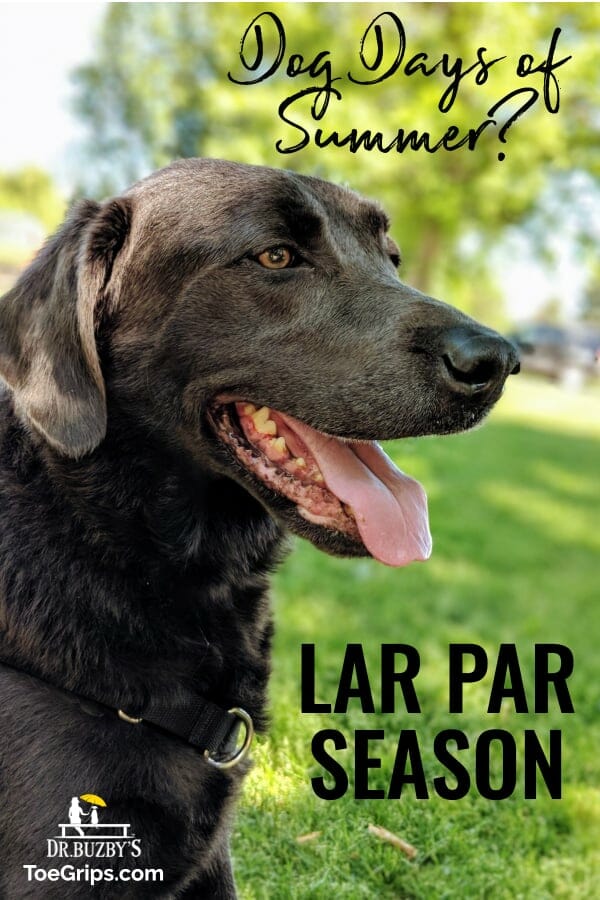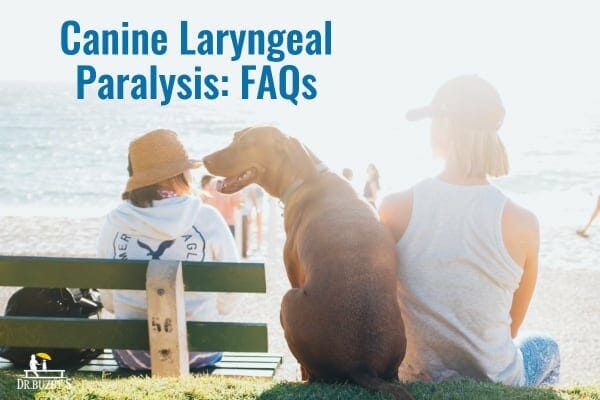If you’re searching for answers to questions about doxepin and other supportive therapies for canine laryngeal paralysis (lar par), hope and help are here. As a follow up to her ultimate guide on laryngeal paralysis in dogs, integrative veterinarian Dr. Julie Buzby discusses doxepin for dogs with lar par, non-surgical management of laryngeal paralysis, and answers reader questions. Knowledge can inform our decisions and bring peace to our hearts.

Non-Surgical management of canine laryngeal paralysis
When it comes to laryngeal paralysis in dogs, I firmly believe that we all have a lot to learn. By no means do I have all the answers to questions, but as a veterinarian, I have access to professional resources and research. Thanks to both, as well as my own experience with my canine patients, I can offer some information, as well as answers to some commonly asked questions about doxepin and medical management of lar par.
Doxepin for dogs with laryngeal paralysis
If your dog has been diagnosed with lar par, you’ve probably read enough to know that doxepin is promising, controversial, and confusing all in one. Let’s shed some light on doxepin for dogs with laryngeal paralysis.
Does doxepin help dogs with lar par?
So far, the use of doxepin to treat laryngeal paralysis in dogs has been primarily based on anecdotal evidence rather than research. This treatment has not yet been studied extensively enough to have research-based conclusions on its efficacy. I can add my own personal accounts of doxepin helping my canine patients.

Interestingly, doxepin is purported to help 50% to 75% of dogs with lar par. Dogs treated with doxepin tend to either respond really well or not at all—there are not a lot of grey areas with its use. Thus, I believe doxepin has the potential to noticeably help some dogs with laryngeal paralysis.
However, it’s also important to note that doxepin is not an appropriate treatment for dogs in crisis. Generally, veterinarians who prescribe doxepin do so for lar par management in dogs who are symptomatic but stable. Doxepin is just one tool in the toolbox for vets who are trying to help their canine patients suffering from lar par.
What kind of drug is doxepin?
Doxepin is in a class of medications known as tricyclic antidepressants. It also has antihistamine properties and sedating effects. It is possible that the calming effect of doxepin is a large part of how the drug helps dogs with lar par.
Why is sedation helpful for dogs with lar par?
With laryngeal paralysis, stress compounds the problem. So much so, that keeping your dog calm is as important as keeping your dog cool. The “perfect storm” for a crisis in these dogs is the combination of environmental stress, heat/humidity, and respiratory distress.
Because of this disastrous trifecta, sedative medications are sometimes prescribed for dogs with lar par. Doxepin may be a good choice for these dogs since it seems to provide direct benefit to the function of the larynx and can also be sedating.

In what ways is doxepin reported to help dogs with lar par?
When it works, doxepin seems to reduce the respiratory effort of dogs. They often experience less stridor (noisy breathing), less coughing, and less anxiety. This translates into improved quality of life for both the dog and the family.
Please do keep in mind that we now believe laryngeal paralysis is an early symptom of a progressive, neurodegenerative process called geriatric onset laryngeal paralysis polyneuropathy or “GOLPP.”
Since there are no effective cures for degenerative neuropathies at this time, doxepin is working strictly to aid the breathing component. In other words, it’s not treating the underlying cause. Nonetheless, doxepin can be a wonder drug for certain dogs.

A research study on doxepin for dogs with laryngeal paralysis
A five-year study called “Effects of doxepin on quality of life in Labradors with laryngeal paralysis: A double-blinded, randomized, placebo-controlled study” was recently completed. Originally the plan was to evaluate 40 Labrador Retrievers with laryngeal paralysis over a one-month period. Twenty of the dogs would receive doxepin and 20 would serve as the “control,” only receiving a placebo. At the start and end of the study, the owners of the dogs were to fill out a questionnaire about their dog’s symptoms and quality of life.
However, the study ended up being terminated at the midpoint. When the investigators evaluated the owner-supplied data on the questionnaires from the first 22 dogs (12 taking doxepin and 10 on the placebo), they determined that there was no noticeable benefit to doxepin compared to the placebo. The owners of some dogs in both groups reported improvement and the difference between them was not statistically significant.

While this research paper did not support the hypothesis that doxepin could improve quality of life measures in dogs with laryngeal paralysis, I still think it can have value for some dogs. I think we need more studies on a broader scale, with more dogs included, before I would say studies prove doxepin is not effective.
Doxepin is generally safe and doesn’t tend to have severe side effects. And I have personally seen it make a difference in the lives of many dogs. For these reasons, I will continue to use it as one tool in my toolbox of management options for canine laryngeal paralysis.
Are there other medications for treating lar par in dogs?
There are no medications that directly treat the underlying neuropathy that causes laryngeal paralysis in dogs. Our focus with medical management is on minimizing the symptoms of the disease.
This is part of the doxepin mystery, but doxepin is the only medication that seems to significantly improve the symptoms of lar par in dogs. Other drugs with similar mechanisms of action, like amitriptyline, have not been efficacious—that is to say effective.
A few different medications have been tried to see if they can help dogs with lar par. Gabapentin for dogs can be beneficial for treating nerve pain and neuropathic conditions. It can also have some mild sedative effects. Unfortunately, it does not appear to treat the symptoms of lar par in dogs.
Since doxepin has antihistamine properties, it would make sense that other antihistamines, such as Benadryl (diphenhydramine) for dogs and/or bonine may help as well. Again, these medications do not seem to lead to improvement in lar par symptoms the way doxepin does.
This leads us to the million-dollar question…
How does doxepin work for canine laryngeal paralysis?
The short answer is this: We do not really know.
The long answer is based on a compilation of theories and observations. We know that the mechanism of action is not primarily from doxepin’s sedative effects because other sedating medications in dogs don’t work nearly as well to improve the dog’s breathing.
There’s something special about doxepin.
I’ve seen guesses about it affecting neuropathic pain and reducing spasms of laryngeal muscles.
We know that doxepin has anticholinergic effects—which means that it blocks the effects of a chemical signal in the nervous system. Plus, it has antihistamine and antidepressant effects. But frankly, we do not know exactly how doxepin helps dogs with lar par.

Hopefully, with more research, we will eventually understand the mechanism of this mystery medication.
Doxepin safety
Here’s the good news—doxepin, along with other medications in its class, is generally considered safe for dogs. This is notable because if doxepin helps a dog with lar par, he or she will probably be on it for the rest of his or her life.
We’ve already mentioned that it can be sedating. Because of the anticholinergic effect, doxepin can increase the dog’s heart rate. For this reason, it should be used judiciously in dogs with heart disease, especially at higher doses. It is contraindicated in dogs with glaucoma, which means it should not be used.
As with any medication, have a discussion with your veterinarian about whether it would be a good choice for your dog. You and your vet make the best team to decide what will keep your dog happy and healthy.
Can my dog who is on CBD also take doxepin?
Always speak with your veterinarian about the drugs and supplements that your dog is taking, as interactions are both possible and potentially very dangerous. I do not know of any red flags for dogs taking CBD and doxepin together. That being said, we are still learning a lot about the use of CBD oil in dogs.
Doxepin dosage for dogs with laryngeal paralysis
It is my practice to avoid discussion of drug dosages in our blogs, and that is even more relevant here because doxepin is a prescription drug being used “off-label” for laryngeal paralysis.
However, here are some general dosing guidelines:
- Dogs are typically given the medication twice per day (every 12 hours).
- Capsules come in 25, 50, 75, and 100mg. Dosage is based on a dog’s body weight and the severity of the disease.
- Typically, higher doses of doxepin are required for more severe cases of laryngeal paralysis.
Once again, discuss any new medications or dosing changes with your vet before medicating your dog.
Doxepin vs. tie back surgery
Compared to surgery, doxepin is a much more conservative option. Therefore, it may be used as a “first line” treatment for dogs with “noncritical” laryngeal paralysis. This is how I use it for my own lar par patients who are breathing well overall.
But I have to confess that tie back surgery for dogs, in my experience, is often the appropriate long-term choice for my patients with laryngeal paralysis. At a minimum, tie back surgery is worth researching, considering, and discussing with your veterinarian.
For perspectives from dog parents who chose tie back surgery, please read these quotes…
“Oscar, our 13-year-old, career change yellow Lab had tie back surgery for lar par, and for the last year of his life breathed so much easier. The small chore of changing his food, watching him eat, standing, and making sure he didn’t eat or drink too fast was worth it…We were so happy to spend the money to give him a last 9 months of freedom from stress!” ~ Janelle
“My 13-year-old mutt was diagnosed with lar par last year. He had slight relief on doxepin, but as the weather got warmer, he got worse. He had tie back surgery done and is now living his best life as a 14.5-year-old. Surgery can be expensive, but I highly recommend it! It immediately changed his quality of life, and mine, as I didn’t have the constant anxiety of worrying about him.” ~ Liz
Now that we’ve discussed doxepin, let’s take a look at some ways to support your dog through a combination of approaches.
Supportive therapy for laryngeal paralysis/GOLPP in dogs
Because we now know that laryngeal paralysis is part of a broad, progressive neurologic syndrome (GOLPP), dogs with lar par often have other neurologic deficits, such as hind-end weakness.
Neurologic weakness and slipping are biomechanical problems that medication does not treat very effectively. Treatment of geriatric onset laryngeal paralysis polyneuropathy (GOLPP) should be multimodal. In other words, your veterinarian will likely recommend a combination of medicine, supportive care, and home management practices.
Supporting your dog with GOLPP
Anytime veterinarians are treating any condition, they always want to take a look at the whole picture. This not only includes the biology of the patient and the pharmacology of the medications but also the environment your dog lives in.
Though medication options are somewhat limited, dogs with GOLPP can be helped with some home environment modifications. Most of these changes are easy, and you can get a big “bang for your buck.” That is to say, your dog can benefit a lot from relatively low-effort modifications.
Some things that can help your dog with GOLPP be more comfortable include:
- Using a harness rather than a collar for walks
- Avoid overheating
- Minimize stressors (for example, if your dog gets very anxious in the car, try to keep trips to a minimum)
- Prevent overexertion—long hikes and afternoons at the dog park are probably not a great idea
- Provide comfortable bedding for him or her to rest
- Maintain traction on hard or slippery floors

Maintaining traction for dogs with GOLPP
One of the best-kept secrets for GOLPP dogs is the use of ToeGrips® dog nail grips. Placed on the toenails, ToeGrips provide both stability and increased conscious proprioceptive stimulus. They can help improve mobility and confidence for dogs with GOLPP.
Our blog readers explain ToeGrips® dog nail grips for GOLPP dogs this way:
I had a Border Collie with GOLPP…Fortunately for us, the laryngeal component of his neuropathy never got severe enough to require surgery. His hind end weakness did become problematic though, and the ToeGrips we got from Dr. Buzby’s were a great help his last few months. With good vet assistance and support, my boy made it just shy of 16, so there is good hope for those dealing with this problem for extended periods with good quality of life.
Lynda
We lost our amazing foster failure, “clown in a Dogsuit,” Labrador, Beau to GOLPP…not from a breathing crisis as doxepin did help him tremendously, but due to the overall nerve degeneration and mobility and esophageal issues. We have tried to make something good come from his loss by helping others navigate the disease and passing on all the cooling and calming tricks we learned along the way. He also left his DNA at UW-Madison for their study in lar par/GOLPP and at Cornell for their Biobank and Labrador Health Study. He lives on through the research done with his DNA. And we did used ToeGrips for Beau with success too!!
Ally

Laryngeal paralysis FAQs
With such a complicated and serious disease process, of course, questions will arise. Veterinarians are still asking and researching questions about GOLPP! Although it would be impossible to address every question in a single blog post, here are some of the more common questions I field about lar par in dogs:

1. My dog makes a coughing noise that sounds like croup or a barking seal. He also gags or wretches but nothing comes out. Is gagging and coughing associated with lar par?
Yes, what you are describing fits with laryngeal issues. However, “inspiratory stridor” (raspy, noisy breathing) is considered the hallmark symptom of lar par. Other symptoms can include:
- Voice/bark change
- Coughing or gagging, especially when eating or drinking
- Exercise intolerance
- Excessive panting
- Respiratory distress
I recommend discussing your dog’s symptoms with your veterinarian. A laryngeal exam under sedation is considered the gold standard for diagnosis.

2. Why is heat stroke more likely for dogs with laryngeal paralysis?
Dogs pant to cool off, and dogs with laryngeal paralysis are much more prone to heat stroke because of their inability to effectively dissipate heat.
As dogs with laryngeal paralysis begin to overheat, they begin to breathe harder, but they can’t move air efficiently. This creates a vicious cycle where neither the exchange of air nor the dog’s attempt to cool the body works properly, often leading to heat stroke in dogs.

Because of their increased risk of respiratory distress and heat stroke, it’s so important that dogs with lar par stay inside in cool areas during the summer months and the hottest parts of the day. Try to take walks in the early morning or evening to avoid heat exacerbating lar par symptoms.
3. When going for a walk my dog pulls. Can leashing pulling cause lar par?
There are documented cases of dogs developing laryngeal paralysis from damage to the nerves innervating the larynx as a result of the following:
- Neck surgery
- Cancerous tumor growth
- Deep trauma (bite wound)
However, these cases are really the minority. I asked an expert board-certified veterinary neurologist, Dr. Bill Thomas, to explain why…
The most important thing to understand about laryngeal paralysis in dogs is that it’s almost always a polyneuropathy—that is, a disease affecting multiple peripheral nerves. If you do electrodiagnostic testing on dogs with laryngeal paralysis, you typically find other nerves are also abnormal.
Many neuropathies affect the longest nerves the most. And the recurrent laryngeal and sciatic nerves are the longest, so they are often the most severely affected. (Meaning symptoms would manifest first and most predominantly in the larynx and hind legs.)
It would be possible for any sort of severe cervical (neck) trauma to affect the recurrent laryngeal nerves. But these nerves are pretty well protected and lie in some loose fascia (connective tissue) right next to the trachea.
So I think it would be pretty hard to damage both of those nerves, one on each side of the trachea, without damaging the trachea or larynx itself. Not to mention all the other important stuff in the neck larynx—esophagus, common carotid, vagosympathetic trunk, jugular veins, vertebrae, and spinal cord.
Bill Thomas, DACVIM (Neurology), University of Tennessee
Although we know pulling on a collar won’t cause lar par, neck leads can irritate the larynx in dogs that already have this condition. I recommend using a harness rather than a collar for walks, especially if your dog is prone to pulling on a leash.

4. Is canine laryngeal paralysis similar to collapsing trachea?
Lar par and collapsed trachea in dogs are different structural problems. However, both conditions can manifest with a similar presentation—a dog struggling to breathe because the breathing channel has narrowed.
In laryngeal paralysis, it’s because the arytenoid cartilage(s) in the larynx are decreasing airflow. With collapsing trachea, as the name implies, the windpipe (trachea) flattens and airflow is decreased.
Also, collapsing trachea tends to be a small dog issue, and lar par is mostly seen in large breeds.
5. Our dog and his littermate both died from laryngeal paralysis. Is lar par hereditary?
The precise cause of GOLPP, the polyneuropathy associated with laryngeal paralysis, remains unknown. However, since the condition is most common in certain breeds (Labradors, German Shepherds, Golden Retrievers, Siberian Huskies, and others), it makes sense to suspect that there is a genetic factor. But this is just speculation at this point. More research is needed.
Keep in mind that polyneuropathies can have many underlying causes. I’m sure some of those underlying causes are influenced by a hereditary predisposition.
Also, it’s worth mentioning that there is a congenital form of lar par which may show up in very young dogs (in contrast to GOLPP which affects older dogs). For Black Russian Terriers and Leonberger dogs, there are tests for this congenital disease. For more information, please read these articles from veterinary colleges: JLPP in Black Russian Terriers and Genetic Test Available for Early-Onset Inherited Polyneuropathy in Leonberger Dogs.
6. How will I know if it’s time to euthanize my dog who is suffering from laryngeal paralysis? I can’t imagine saying goodbye.
It’s heartbreaking to watch your dear dog declining and trying to make the difficult decision of when to euthanize him or her. I understand because I’ve been there. What I want you to avoid at all costs is the desperation of making this decision while your dog is in a life-threatening breathing crisis.
I would strongly recommend talking to your veterinarian about your thoughts. Your vet is your ally in navigating this heartbreaking journey and will give you honest answers based on his or her observations and examination findings.

You may consider using a dog quality of life scale to help decide when euthanasia may be the best decision.
Also, I’d like to give you some resources that may help. I’ve written the following articles to address this difficult decision:
- Signs Your Dog is Dying — a caring message to bring you comfort
- Preparing for Your Dog’s Euthanasia — 10 thoughts for peace
- Dog Euthanasia — knowing when it’s time to say goodbye
- Grieving the Loss of a Dog After Euthanasia — finding peace through the difficult process
7. Are there any lar par support groups?
Yes! The Laryngeal Paralysis (LP) GOLPP Support Group on Facebook is a great place to connect with other pet parents with similar experiences. It can be a great resource for sharing stories and ideas.
Please remember, however, to always discuss treatments and supplements with your veterinarian before starting anything new. What works for one dog may not necessarily be the best for another. Your vet is your best resource to choose the management that is right for your dog.

Do you have questions about canine laryngeal paralysis?
Please keep the questions, comments, and stories coming. We can all learn from each other.


Thank for this very thorough examination of Lar Par.
Our 12.5 y.o. Golden Retriever has developed Lar Par, and I have been researching the condition quite a bit. Not mentioned in your discussion is the very promising treatment of the minimally invasive stent procedure.
With an older dog, the highly invasive and dangerous tie-back surgery seems to be a last-ditch option, which older dogs may never fully recover from. That a dog may not swim after tie-back also seems kind of cruel to retrieving breeds. The stent procedure has shown potential for positive outcomes.
It has been disappointing none of the vet schools seem to be exploring this as a treatment option for Lar Par, and the cynic in me believes this might be tied to profit motives.
For now, we will continue Doxepin treatment, and the precautionary measures to minimize stressing his system. We have also begun a supplement for older dogs to support retention of muscle mass, as noted in the article there is some atrophy of hindquarter musculature.
Hi Perry,
Thank you for bringing up this very interesting topic! To be honest, I had never heard of a stint for this type of condition until I read your comment. Since then, I have done a bit of research of my own to better understand the pros and cons of the procedure. My thoughts are that this could be a good option for those that cannot afford traditional surgery. But since the stints are not sutured in place, they come with a risk of migration or movement. If they become displaced, a second procedure would have to be done to re-place the stint. Also, the stint holds the airway open just as the airway is held open with sutures when a tie-back surgery is performed. So, the risks of aspiration pneumonia are equal with both procedures, and a dog should not go swimming if they have a stint in place. I myself, had tie-back surgery done on one of my own dogs when she was 14. She recovered uneventfully and went on to live a normal life for 2 more years until she passed from an unrelated issue. I have seen similar outcomes in many of my patients. I applaud you for doing your research and advocating for your senior guy. Ultimately, you have to trust your intuition and do what you feel is best. Praying for a successful outcome and many happy days ahead for your sweet boy.
My 13 yr old French Briard cross with Bouvier de Flanders was diagnosed with Canine Myelopathy this past autumn. Charlot (means Charlie in France) has typical hind end leg weakness, trembling & scuffs his fore and hind feet. He has been panting for the last 6 years, and has a dripping nose. Recently, he developed a high sounding squeal, and a non-productive cough. He is on Gabapentine and Apoquel and shampoo for Canine Seborrhea.. he had pneumonia late autumn. Charlot is very gentle, well mannered & friendly. He ignores the little yapping dogs so common here n the South of France. He is so cute, people stop to take photos of him. He is always in air conditioning in the summer months, and loves the car seat as a bed for naps. Dr Buzby, your articles are so well written and informative, They are the first time I have read about LarPar and GLOPP. Thank you so much, I will ask our vet about this condition.and the drug treatment & toe grips. She is a very experienced vet. Thank you so much!
Hi Monica,
Thank you for the kind words! I am glad the article was informative and will help guide the conversation with your vet. Charlot sounds like an amazing guy, and it is clear he lives a wonderful life and is dearly loved. Hoping you can find a way to keep his condition stabilized and allow him many happy days ahead. Wishing you both all the best and give your sweet boy a hug for me. ♥
For what it is worth, we have a cat with suspected lar par, and was prescribed a low dose of doxepin with gabapentin (low enough that we have to go to a compounding pharmacy to get the pills). And tie-back surgery was indeed also mentioned as a possible longer-term solution. And even though we have a cat and not a dog, the article was still quite informative.
Our problem is the age-old problem of giving pills to cats. We can give him the pill with a lickable treat, but that’s sort of a crap shoot. Sometimes he gets the thing, other times he licks around it and doesn’t get the pill.
All this said, my sense is that he breathes better when he does get the pill, but that’s really just my impression.
Hi Eric,
This is so interesting! I am sorry you are having trouble reliably getting the medication into your cat. I wonder if this could be compounded into a liquid? Thank you for sharing your experience with us. Wishing you and your sweet boy all the best!
Dear Dr. B
I adopted a black and tan coonhound , a beautiful senior girl , a year ago. I was told she had arthritis and given a script of rimadyl .
Two months later she came down with pneumonia and my vets instinct was LarPar. She was sedated and it was confirmed. I heard about doxipine through your website and immediately called for a prescription., I have read everything I can get my hands on and have tried to get on the Facebook group you have listed but so far I have not been successful . My girl Giselle deserves the best I can give her. I need guidance on anything holistic I can do to make her life the best.
Thank you for all you do for our canine families.
Hi Carol,
I am sorry your senior girl has received this difficult diagnosis. She is lucky to have you taking such an active role in advocating for her health and well-being. You can always try acupuncture or herbal supplements. The focus would be keeping your pup calm and preventing anxiety and inflammation. It may be a good idea to locate a vet in your area that practices Traditional Chinese Medicine. Hoping you can find the best way to help your girl maintain her quality of life. Praying for clarity and many happy days ahead. ♥
Can Gabapentin be given with Doxepin (spaced out)??
Hi Kelli,
I did some research to see if these two drugs caused an issue when given together. The only thing I could find is that they may increase the activity of each other. In other words, they may cause increased drowsiness or wobbling, and you may not need as high of a dose when given together. I would discuss this with your vet and see if they think it is safe to try. Best of luck to you and your pup!
Hello Dr Buzby,
Your article has been so helpful! I do have some additional questions though. My girl Molly, a 12.5 yr old Boglen Terrier (Beagle/ Boston Terrier mix was most recently diagnosed with Lar Par after sedation and being examined with the scope.
First she was given Prednisone for a 3 day dose and then we began the Doxepin 50mg twice a day for 14 days and then only once a day. We are currently on day 4. How soon after beginning Doxepin should you notice changes if in fact it is going to help the animal?
Prior to being diagnosed she was taking Apoquel once daily and has been for years for her allergies. I was told to discontinue the use of Apoquel but am noticing she is licking herself and scratching her face (both which she did prior to starting the Apoquel years ago).
Is it okay to give the Apoquel 16.5mg with the Doxepin?
Truly appreciate your time!
Hi Jodi,
I am sorry Molly has received this difficult diagnosis but glad you know what you are up against. These are great questions, but I am honestly not sure of their answers. The Doxepin can take several days to reach its full potential, but I would not make the final call on its effectiveness until your girl has been taking it for a few weeks. I am not sure if there are any drug interactions between Doxepin and Apoquel but this would be a great question for a specialist. If you wanted to speak to someone with internal medicine or dermatology, your vet should be able to make the referral or schedule a consultation. Hoping Molly will begin to show improvement and praying for many happy years ahead. Best wishes to you both!
Just to let you know that Rottweilers also suffer from a juvenile form of laryngeal paralysis (JLPP). It’s always fatal by about 6 months and a genetic test is now available. All registered breeders are requires to test their breeding stock, and only breeding clear to clear and clear to carrier is allowed in Australia.
Thanks for a great article.
Hi Bobbee,
You are absolutely correct. This is something that is discussed in our other article: Laryngeal Paralysis in Dogs: The Ultimate Guide
Thanks for sharing this important information with us! Best wishes!
Hi. I am only now finding out about Doxepin. I want to put my Pointer on it. However, he has Addisons Disease and is taking very low dose (1/4 of a pill q 2 days). Will the Doxepin be okay for him to take? He is 12, but has lots of energy, loves to play and go to the off leash park. I take him in the morning when it is cooler. This boy is my very best pal in the whole world and I just don’t know what I will do without him, although I realize he can’t live forever. He has NO issues with his hind end and can still jump in and out of the car easily. I started him on Glucosamine as soon as we rescued him 10 years ago. I digress. Doxepin and Prednisone okay together?
Hi Sandy,
I can only imagine how hard it must be to keep your Pointer calm but still allow him to exercise. I am glad he seems to do well in the cooler morning air. There are no drug interactions listed for Doxepin and prednisone in the veterinary drug manual and therefore should be safe to give together. With that being said, your vet will advise you whether Doxepin is a safe option for your boy and if it can be used with his current medical conditions and treatments. Wishing you both the best and hoping your senior guy will continue to thrive and love life.
Dr. Buzby, Thank you for providing so much information about larpar, and especially about using doxepin.
My 14(?) year old shelter mutt Bennie is suspected of having larpar (no scope or sedated exam yet, as he’s vet-averse). His primary symptom is constant panting, starting in spring of 2022. His bark/howl is not as strong. He’s VERY furry, so we work hard to keep him from being exposed to the southern heat. We suspect that he also has “hidden reflux.” He usually maintains pretty well during the day with panting and only occasional “loud” breathing – but nighttime might be getting a little worse. He does some lip-smacking, circling to get comfortable, and excessive panting, until I get him cool and calm and then he settles down for the rest of the night.
His vet doesn’t seem thrilled about the idea of doxepin, but she’s willing to prescribe. She has started him on trazodone, though, for times when I need to calm him. In your experience, since you mention doxepin can be sedating – is there more benefit to him to just trying the doxepin instead of messing with JUST sedating him with trazodone?
Hi Cara,
This is a great question! There is unfortunately so much that we don’t know about doxepin yet. I will say that in my experience it is either super effective or does almost nothing. And there is no great way to know which dogs it will work for and which it won’t. I haven’t examined your dog, so ultimately I will defer to your veterinarian, but in my opinion, it could be worth giving doxepin a try. One big word of warning though is that you should not use trazodone and doxepin together as that could increases the risk of a dangerous condition called serotonin syndrome. If you do think you want to try the doxepin, please run it by your veterinarian again and ask her what sort of washout period between the two she would recommend (if any…I don’t know from the post how often he is taking the trazodone).
I hope it works for him (or if it doesn’t, that you find some good solutions for him!) Please feel free to give us an update!
I just lost my wonderful Grizzley Bear yesterday to pneumonia just 10 days after tie back surgery. We were so careful with post surgery eating and water intake. I am wracked with guilt for making his last days an uncomfortable post surgery recovery that ultimately did not improve his life.
I was never even told about the option of doxepin until a friend told me this morning. Wish I had been given this information to consider. I was only presented with surgical option.. So glad you are giving people a non surgical option. I understand that it will not help every dog, but its an option that has a much less risk for a dire outcome.
Dear Teresa,
My heart aches for you with your tragic loss of Grizzley Bear. You did everything you could to give him the best chance at life, and I would have made the same choices for one of my own. I can only imagine how much you must miss him but hope you can take comfort in knowing he was dearly loved. Thank you for the kind words about the article. May his memory live on and be a blessing in your life. ♥
Hello Dr Julie
I have 13.3 old female German Shepherd.
she was diagnosed with LP.
Lately she is having trouble sleeping and wakes up breathing harder,more pronounced Then starts to licking herself.
or imitate that she wants to swallow something.
Usually I offer her drink and that makes her calm for a bit.
My Dr dosen’t really knows what this could be .
Assuming LP has something to do with this issue.
I wonder if there is something more than just LP?
Another question is if I can give Doxepin with thyroid medicine Levothyroxine 0.8 mg?
Thank you very much
Grace
Hi Grace,
I am sorry your Shepherd is having so many issues due to laryngeal paralysis. Without examining her myself, I can’t make specific conclusions or recommendations. I am a bit suspicious that what you are describing is all related to the LP. I am not sure how the Doxepin would affect the use of thyroid medications. There are no specific contraindications mentioned in our veterinary drug handbook about using these medications at the same time. I highly recommend you contact a specialist to have your dog examined and see what treatments she may be a candidate for. I like to defer to the experts when dealing with complicated cases like this and I think a specialist would be a good fit for your sweet girl. Your vet should be able to make a referral for you and get the ball rolling. I am hopeful you will find the answers you need to restore your pup’s quality of life. Wishing you both the best.
Hi Dr. Buzby. My 10 year old Black Lab Josie has been gagging loudly one or two times a day for the last 2-3 weeks but it isn’t during eating or drinking.. however it is not a normal sound for her. I just started having to lift her hind legs to get her up into bed this week. She is still able to go for our long walks in the morning with no problem in the morning though. Her demeanor is good and she is eating and drinking normally. Should I be concerned?
Hi Stacey,
Yes! From what you are describing I am extremely suspicious Josie may have GOLPP as mentioned in question number 14 in the article. Of course, without examining her myself I can’t be sure, but I highly recommend you have her evaluated by your vet ASAP.
Hi Dr. Buzby,
You’re so helpful, this is my second time reaching out!
Our 12 yr old Golden, Cam, was recently diagnosed w Lar Par and has been on Doxepin for a little over a week and it’s helped greatly! However, even after we’ve elevated both his food and water, the past few mornings he’s immediately regurgitated his breakfast (1 cup kibble from slow feed bowl), but has had no issue with his wet food at dinner (also in slow feed bowl).
Can you tell me if wet food is recommended over kibble? And if multiple smaller meals are better than 2 larger ones?
Thanks so much!
Julie (and Cam 🐾
Hi Julie!
It’s good to hear from you again 🙂
I am glad Cam has been doing well on the Doxepin and his quality of life has improved. Feeding recommendations for dogs with Lar Par vairy greatly and much of the variation is due to each dog’s specific needs. What works for one dog may not work for another. The consistency of the food is one of the main things you sometimes have to experiment with to see what works best. If wet food stays down better than the dry, I would switch to only wet food. Or you can try mixing some of the wet with the dry. Try your regular feeding schedule with wet food only for a few days and see what results you get. Hopefully this will be the magic cure for Cam, and he can enjoy his meals again. Best wishes and good luck!
Our lab was in crisis due to lar par & had to be rushed to the emergency vet. We got him stable & they’re keeping him until Monday when the tie back surgery can take place. My question is: with having the tie back surgery is the use of this medication indicated post surgery for prophylactic care to mitigate any future crisis events? Or is it only to attempt to try to help lar par symptoms/ episodes prior to tie back surgery?
Edit: we live in Houston area, so trying to figure out best ways to help him post surgery as we know heat/humidity are exacerbating factors to this condition.
Hi Rebecca,
I am sorry your boy experienced a crisis episode and had to be rushed to the ER. I know how scary that must have been and how worried you still are about his condition. The medication mentioned in the article is to attempt to medically treat lar par to try and avoid surgery. I do think it would be good to discuss this with the veterinary surgery specialist that will be performing the procedure and get their opinion too. I hope your boy was able to be stabilized and that the surgery went well. Praying for a full recovery and many happy years ahead.
Hello: Recently our amazing rescue (mixed lab breed) who is around 11 years old had episodes 3 days in a row after becoming overly excited. One episode happened at the vet and they were able to provide the right medications so he was stabilized. He’s now on trazodone. He literally took his first dose today and we have to make a decision for i euthanasia or the meds. Surgery is completely out of the question as I just gave birth to my new born two weeks ago. Hormones raging and completely devastated about our sweetheart dog. Is there any chance at all the medicine will help him? Thank you so much
Hi Laura,
I understand the concern for your senior guy and these scary breathing issues. It is possible the trazodone could keep him calm enough to avoid future complications, but there is no way to know for sure. You might could continue the medical management at least for a while until you can revisit the possibility of surgical intervention. Just know, no matter which decision you make, you could end up in an emergency situation with a difficult decision on your hands. I suggest you have an honest discussion now about what your wishes would be if a sudden tragic situation should arise. That way your family and your vet are all on the same page and it will minimize the distress of making big decisions while you are emotional. I hope the trazodone works like a charm and that you have many happy memories ahead. Congrats on the new addition to your family! ♥
I have a wonderful golden lab, Alex, who is just 12 years old this month. She was diagnosed with an elongated soft palate 11 years ago as well as temperature regulation issues (all discovered because of breathing issues). She is a high anxiety girl, always has been. She is currently being weaned off Prozac so I can start doxepin. Her regular vet did a direct view diagnostic of her larynx and thinks she most likely has Lar Par. I am very worried about her because of breathing episodes she is experiencing at night. She seems to sleep well until all of a sudden she wakes up and gets very anxious. It is hard to tell what she is experiencing but upon waking, she tries to inhale deeply but it seems futile. She commences licking furiously, like her life depends on it. She seems to be ‘junky’ and have fluid somewhere, not sure if it is in her nose, esophagus, trachea or where it is but it seems she is trying to clear it by licking. These episodes sometimes only last 5-10 minutes, other times for a half hour. Of course, her anxiety issues just make this all worse. Does this behavior when waking from a deep sleep sound familiar to you? I have not heard anyone else speak of it when describing Lar Par. Just before she wakes, it appears that she may have stopped breathing. Sometimes I wake her up myself if I notice the disruption in breathing. It always leads to the licking episode. These night time episodes are now frequent and sometimes happen multiple times per night. Any ideas and follow-up recommendations? Thank you.
Hi Grace,
I understand the concern for your senior girl and these worrisome nighttime episodes she is experiencing. It makes wonder if the lar par is causing a complete airway obstruction while she is asleep. I also wonder if maybe she has a buildup of mucous in her airway during sleep that she tries to clear with all the licking. Since I have not examined your dog myself, it is hard to make specific conclusions and recommendations. Make sure your vet knows about the increased frequency of these nighttime issues and how it is affecting your sleep (both you and your dog). They may want to try new medications to see if she can be medically managed or your girl may be a good candidate for airway surgery to help correct the problem. You have the option to schedule a consult with the veterinary surgeon who would perform the surgery and get their professional opinion as well. I hope you can find the answers you need to make the best decision for you and your pup. Praying your sweet girl can find some relief and get back to living her best life.
How long can our dog (Gracie) live with LP using just Carprofen and Doxepin as medications? She is 13 years old so we aren’t going to do the tie back surgery. She was diagnosed with LP back in October 2021 and didn’t need medications until just recently, starting 12/30/21. What is the average life span once LP has been diagnosed?
Hi Mark,
I understand your concern about surgery for your 13-year-old girl. Unfortunately, surgery is sometimes the only option for a dog with LP that is no longer well managed with medications alone. Age by itself doesn’t necessarily make a dog a bad anesthesia or surgical candidate. I will attach a link to another article that might provide additional information on this topic. The average life span for a dog with LP varies widely and depends on the ability to prevent a crisis situation where the dog might end up in respiratory distress. Also, if your dog has hind limb paralysis associated with the laryngeal paralysis (GOLPP), losing the ability to walk may affect her life span or the decision to say goodbye more than the breathing issues. Ultimately, if you have any concerns about the effectiveness of the medication, I recommend you talk to your vet. I hope you can figure out what works best for you and Gracie. I wish you both many happy days ahead to continue to make memories together.
Is My Dog Too Old for Surgery?
Hi! I want to make surgery a last resort, and my doggo is on calming medicine, but is there anything I can do while he is actively having an episode? Does anyone know if massages or rubbing on him helps? He’s completely fine and healthy when he can breathe, but his last 2 episodes made him fall over and I just want to help him.
Hi Jessica,
It can be so hard to watch them struggle. I understand you wanting to find something to help your dog while he is having an episode. Anything that will help him relax and calm down will also help his breathing. My main concern is that he is still having so many episodes despite taking the calming medicine. I recommend you talk to you vet and discuss the frequency and severity of your dog’s episodes. I know you want to avoid surgery, if possible, but it may be time to weigh the risks verses the benefits. Thank you for being an advocate for you sweet guy. Good luck to you both as you navigate this difficult journey.
My sweet , 11 year old chocolate Labrador (George) was diagnosed about 2 years ago with dilated cardiomyopathy that was well maintained . The treatment potentially was pimobendan but the doctor didn’t think George needed to take it so I didn’t have it prescribed for him. Then about 8 months ago, he was diagnosed with a mast cell tumor. He had the tumor removed and so far is ok but it was biopsied and showed a high grade which meant it had a high likelihood of returning. Then about 3 months ago, when it started to get hot and he was running with me, he started to have episodes of respiratory distress/ collapse and he was tentatively diagnosed with LP. The vet said he had a mild form brought on by heat and exertion and was told to no longer run him and only take him outside to do his business. This is what I did but he still had 3 major cyanotic respiratory crises which he has managed to recover from himself. I would get him cooled down either with a cool body of water nearby or my car with air conditioning and get him home as quickly as possible. However, this is so frightening seeing my dog suffocating and being relatively helpless to help him. George has an appointment at the UT Veterinary Specialty Clinic to discuss the tieback surgery but I was wondering if I could test out the doxepin on him first. Does anyone know if doxepin can be taken for a dog diagnosed with DCM? Also, George has been on harness for about 8 years now but wonder if there is a specific type/brand recommended for LP. I think based on his other symptoms that he has GOLPP.
Hi Karen,
It sounds like your sweet pup has had his share of concerning medical problems in the last few years. It is so scary to see our beloved pups in respiratory distress and feel helpless in the situation. I am glad that he recovered each time! Since I can’t examine him, look at x-rays of his heart, etc I can’t give you a definitive answer on if it would be worth trying doxepin for him or not. You could definitely consider asking your vet about it. I would still recommend going forward with the consultation at the UT Veterinary Specialty Clinic too because there is often great value in getting a specialist’s opinion. Doing the consult doesn’t mean you are locked into doing the surgery, it is just a way to get more information and find out if tieback surgery would be the right choice for him. In case you haven’t seen it, here is my article on tie back surgery: Tie Back Surgery for Dogs with Laryngeal Paralysis
My 12 year old black lab was recently diagnosed with LP. Her vet said there is no surgery or medication to fix it. After reading up on it I know there is. My problem is she gets too excited when I take her anywhere ( current vet is 5 minutes away) and she has a hard time breathing. So I’m scared to take her to another vet & her suffocate on the way there. So my question is can I give her anything over the counter to help her? I read one person gave their dog benadryl daily and that helped the breathing.
Hi Andrea,
I’m sorry to hear that your dog is struggling with laryngeal paralysis. I can definitely understand your concern with driving her a further distance to a different vet since she gets so worked up in the car. I can’t safely recommend any over the counter medications but you could consider asking your current vet to prescribe a medications to help keep her calm for car rides in order to pursue a second opinion. Additionally, keeping the car as cool as possible should make it a little easier for your dog to breathe.
We have other blogs on Lar Par that I hope are helpful to you as you seek to make the best decisions possible for your black lab:
Laryngeal Paralysis in Dogs: The Ultimate Guide
Tie Back Surgery for Dogs with Laryngeal Paralysis
I hope you are able to find some solutions that work well for your sweet girl! ❤
My 12 year old choc lab has LarPar and was taking meds for it- well it was an ordinary day it was really hot outside just got done taking her for a walk she came in and started vomiting everywhere and it was hyperventilating breathing out of her nose only- and she then collapsed! my field and I rushed to the closest animal hospital I sat in the backseat with her headache her trying to calm her down they rushed her in immediately and we were told her flap was closed shut she was also having a heat stroke and we were told if we were five minutes later we would’ve lost her her tongue was turning blue! Our only options were euthanasia or tieback surgery or the surgery where they cut out the flap completely. since I had did some research when she was diagnosed in march with it we opted for the tieback surgery because other than the LarPar she was in excellent health it’s still very much puppy in her. they put a breathing tube down her throat and gave her an IV and put her in a temporary coma we told her we would have the surgery but they had to have $5000 upfront to even start this all happened at 2 AM in the morning! So obviously we couldn’t get any money out the bank at that point the next day we got the money together and they did the surgery. This was on May 4th i’ve been doing so much research we’ve been feeding her and little meat balls and making sure she doesn’t drink too fast keeping it way way cold in here at if we know she’s going to get excited ( Company over or fireworks) we give her Trazadone in advance so It can settle her down- it’s an anxiety/sedative. She’s recovering so nicely and her incision is healing perfectly. It seems she’s lost her bark but a little rasp comes out. it’s hard to keep her from barking sometimes as she gets excited to go outside to go potty… My question to you is could her barking excessively pop a suture inside? Also what are the main symptoms of this aspirational pneumonia that she could develop. She still has a bit of a cough/hack but the vet says that’s normal due to the healing in the throat etc. her body temperature seems normal and her nose is becoming wet again. For the longest time her nose was dry even when she was awake which I thought was odd because her nose was always wet except one sleeping. any tips for not getting pneumonia? It’s not been a month yet but I’m scared to death she’s going to get this pneumonia thing. thank you in advance for your advice and for the support group… I want to raise awareness on LARPAR as I did not realize it was so cause it until I did the research. My dog is doing so much better and is of us back to her good self but I know we’re not out of the woods yet. thank you
Hi Christine,
What a scary thing to witness. I’m so glad you got your dog to the ER vet when you did and that they were able to save her life and do the tieback surgery. To answer your questions:
1) It is recommended to keep your dog from barking during the recovery period because barking puts stress on the surgical repair and could cause it to break down. It sounds like you are trying your best to do that, and it is great that you have the trazadone to help keep her calm.
2) Some of the signs of aspiration pneumonia include fever, lethargy, coughing, difficult breathing, nasal discharge, decreased appetite, and changes in rate or effort of breathing. It sounds like your vet thinks her current cough/hack is from the healing process, so that is good. Keep watching her closely and asking your vet (or the specialists who did the surgery) when concerns arise, just like you did for her current cough. The food meatballs can be a good step to help prevent aspiration pneumonia too. Some dogs with GLOPP (geriatric onset laryngeal paralysis polyneuropathy) also have some esophageal dysfunction which can contribute to aspiration pneumonia. You could consider asking your vet if he/she thinks that evaluating your dog’s esophageal function would be a good next step.
I also wrote an article specifically about Tie Back Surgery for Dogs with Laryngeal Paralysis that you might find helpful and encouraging.
Thanks for sharing your sweet girl’s story! I hope that she recovers well and remains free of complications like aspiration pneumonia.❤
Our lab at 12 suffered with lar par and also fluid on the lungs. Probably caused by this condition. We only lost her recently. She had an emergency trachostamy Easter weekend as there was no surgeon there to do tie back we had to choose that or euthinase her. The nxt day we found a surgeon to do the op in a different hospital she died two days later. Possible clot. Or just didn’t have the strength to go on. We were heartbroken and spent our savings trying to save her. I wish she just had one surgery she might still be alive today but unfortunately was a bank holiday weekend and no surgeon around that night. I didn’t get to say a proper goodbye. Please if diagnosed earlier do this op when they are younger.??
Hi Lor,
What a heartbreaking story. I’m so sorry to hear about the loss of your lab. I have no doubt that she knew how much you loved her, even if you weren’t able to say a proper goodbye. May you find comfort in remembering the good times you shared together. ❤
My best boy, Oscar, a mini-Goldendoodle, is almost 15. He has Lar Par and Cognitive Canine Dysfunction and shows signs of anxiety. He is now on Trazadone to calm down and sleep. He has really slowed down a lot, but he can still go up and down stairs, although he prefers not to do so. He also is refusing short walks, and struggles to poop, but does do 3-4 times a day. I am worried he will die suffocating. How will I know when it is time to put him down? I have had to do that twice before and it is heartbreaking.
Hi Fran,
I’m so sorry to hear about your best boy’s struggles. It is always heart wrenching to think about losing them and to have to go through the process of deciding when it is time to let them go. I would recommend you fill out this quality of life scale for your dog as it might give you a better idea of where things stand. I also think you might find these blogs about euthanasia helpful in guiding your decision:
Preparing for Your Dog’s Euthanasia: 10 Thoughts for Peace
How Will You Know When It’s Time to Euthanize Your Dog? 5 Caring, Heartfelt Messages
Preparing for Your Dog’s Euthanasia: 10 Thoughts for Peace
Grieving the Loss of a Dog After Euthanasia (& Finding Peace)
Signs Your Dog is Dying: A Caring Message to Bring You Peace
Finally, I would recommend making an appointment with your veterinarian so you can have a frank conversation about your boy’s quality of life evaluation and seek their support and advice about how to make this heartbreaking decision. Sending love as you struggle with this difficult decision. ❤
I have an 11 yr old Field Cocker who our Vet highly suspects Lar Par. He’s been coughing, gagging, panting, drinking water by the gallons, has had 3 bad episodes where I thought he would not make it. So far I’ve been able to bring him out of them. Scares both of us to death. He is on Pepcid, Gabapentin, and just was given Dioxin. Plus I give him some hemp chews. I live in Wisc and would like a recommendation for a good surgeon who does the V cut surgery. Sounds safer than the tie back. He also has many lipomas all over is body. Two being near is windpipe. Any help or suggestions would be greatly appreciated. My hubby is not thrilled about spending thousands of dollars on an old dog but I feel differently. He’s my sidekick and constant companion. I love him so much and can’t imagine loosing him.
Hello Paula, great questions and thoughts. I would refer you to the Lar Par support group on FB: https://www.facebook.com/groups/813747918695610/ They are amazing and you will find people who TRULY understand what you’re going through and have walked in your shoes. I believe someone in the group has compiled a list of surgeons who have experience with Lar Par. I am confident you will find the info you need there. ♥️
My 10 year old Staffy started exhibiting breathing i had never heard before. We had her from 4 months. She had a scheduled visit with a vet and I mentioned it to her and she could her her loud noisy breathing. She examined her throat and told me she was making herself breath abnormally and that is was fine. I should not worry.
A week later at the same vet she went into respiratory distress unbeknownst to the staff. I left their clinic and an hour and a half later I had her in emergency where the emergency vet told me she had Laryngeal Paralysis and she was ultimately humanely euthanized as we thought her quality of life was poor. She actually likely was suffering from this disease though. This has been a devastating year of grieving for our family.
My question is the symptoms that she displayed and Informed the vet of , was basically brushed off. Do vets need extensive schooling to diagnose this? It a dog presents with noisy, harsh breathing, if there is exercise intolerance , should Lar Par be suspected,
What a tragic loss, Amanda. I am sure your heart is broken. Because Lar par presents differently and symptoms fluctuate with stress, temperature, humidity, etc, it can be difficult to identify and diagnose. And hindsight is 20-20. I know none of this changes the fact that you’ve lost your dog, and I’m so sorry. I pray peace and comfort for your family as you grieve. I know how hard it is. ♥️
My dog s lar par was graded at 80% good on one side and 60% on the other. At what % do they usually recommend the tie back surgery? She is 12 yrs. old and also on Doxepin. Was diagnosed about 2 yrs. ago
Hi Mary, I’m not familiar with a percent grade correlation with a recommendation for surgery, but if she’s clinically affected (meaning she’s impacted by her clinical signs), I do think it’s worth at least learning more about the surgical option. I would suggest you initiate a discussion with your veterinarian and/or veterinary surgeon about the pros and cons of the tie back surgery for your dog.
My nine year old golden retriever was recently diagnosed with probable LP. We recently got a new dog in April, and the two of them play aggressively with a lot of twisting to my dogs neck. Is the rough playing aggravating my golden’s condition?
Hello Joan, Good question! Since we believe GOLPP to be a condition that impacts the whole body, I doubt that your golden’s condition is being exacerbated by play with your other dog around the neck. To the contrary, the play may keep your golden young! I would advise using good common sense on restricting roughness and using your judgement on their interaction. In general, my gut reaction is to let them have fun. Please just be careful because LP dogs can overheat much more quickly than “normal” dogs: https://toegrips.com/heat-stroke-in-dogs/